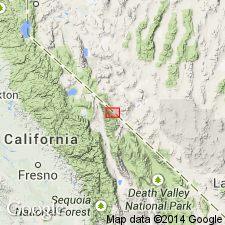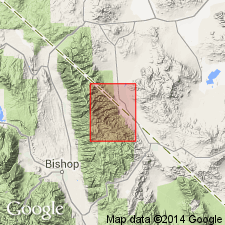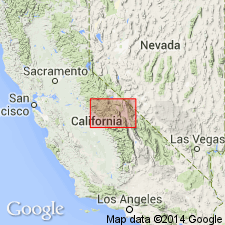
- Usage in publication:
-
- Cabin Granodiorite
- Modifications:
-
- Named
- Dominant lithology:
-
- Granodiorite
- AAPG geologic province:
-
- Sierra Nevada province
Summary:
Rocks of Cabin Granodiorite were formerly part of Anderson's (1935) Pellisier Granite. Unit underlies about six sq mi in northwestern corner of Mt. Barcroft 15' quad, White Mountains, CA-NV. Bordered by sedimentary rocks on east and west, by Leidy Adamellite (new) on north, and by McAfee Adamellite (new) on south. Is medium gray in color, similar to Barcroft Granodiorite (new). Contact relationships show Cabin Granodiorite to be intrusive into the sedimentary rocks and older than the adamellites. Age is Jurassic or Cretaceous.
Source: GNU records (USGS DDS-6; Menlo GNULEX).

- Usage in publication:
-
- Cabin Granodiorite
- Modifications:
-
- Not used
- AAPG geologic province:
-
- Sierra Nevada province
Summary:
Cabin Granodiorite of Emerson (1966) is mapped as "granodiorite of Cabin Creek" which is approximately the same. Described as medium-grained biotite-hornblende granodiorite locally porphyritic and locally conspicuously foliated. Shown as Jurassic age on map of Mt. Barcroft 15' quad, but "relative age unknown".
Source: GNU records (USGS DDS-6; Menlo GNULEX).

- Usage in publication:
-
- Cabin Granodiorite
- Modifications:
-
- Not used
- Geochronologic dating
- AAPG geologic province:
-
- Sierra Nevada province
Summary:
Informal "granodiorite of Cabin Creek" (of this paper) is equivalent to Cabin Granodiorite of Emerson (1966). Occurs in 2 small masses that originally were continuous but are now separated by Cretaceous granite. Typical rock is medium-gray, medium-grained biotite-hornblende granodiorite. Quartz and feldspar are bluish gray. Intruded by Cretaceous granites of McAfee Creek, Leidy Creek, and Boundary Peak. Crowder and others (1973) have determined K-Ar ages of 153 Ma on hornblende and 88 Ma on biotite.
Source: GNU records (USGS DDS-6; Menlo GNULEX).
For more information, please contact Nancy Stamm, Geologic Names Committee Secretary.
Asterisk (*) indicates published by U.S. Geological Survey authors.
"No current usage" (†) implies that a name has been abandoned or has fallen into disuse. Former usage and, if known, replacement name given in parentheses ( ).
Slash (/) indicates name conflicts with nomenclatural guidelines (CSN, 1933; ACSN, 1961, 1970; NACSN, 1983, 2005, 2021). May be explained within brackets ([ ]).

